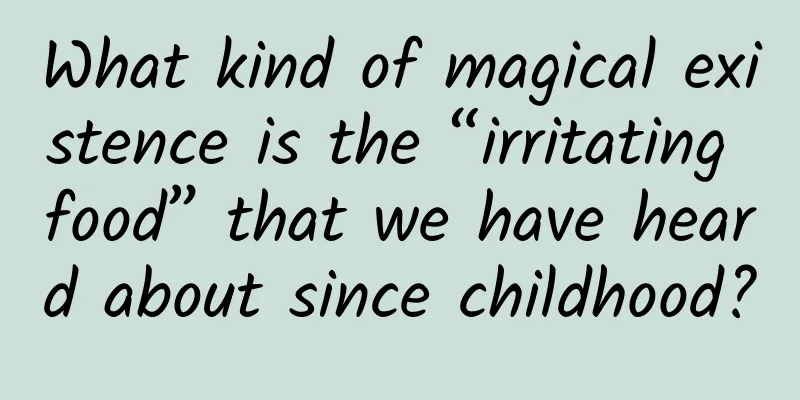What kind of magical existence is the “irritating food” that we have heard about since childhood?

|
"Mutton is fat, don't eat it" "Don't eat irritating foods when you have a cold, it will make the cold worse" "My resistance has been low recently, so don't eat irritating foods." ······ From childhood to adulthood, I seem to often hear about a kind of food called "fawu". When I am sick or injured, there is always something called "fawu" that I cannot eat. What kind of magical existence is “fawu”? What exactly is “hair stuff”? In fact, "fawu" is a folk saying, which was first recorded in "Puji Fang" in 1406. It mainly refers to foods that are easy to induce certain diseases (or uncomfortable symptoms) or easily aggravate existing diseases . There is no fixed type and range. Some foods can induce old diseases, aggravate existing diseases, or weaken the efficacy of medicine if they are eaten too much. This is the "fat nature" of food. What are the “hair products”? From the perspective of modern medicine and nutrition, the following types of food are generally considered to be irritants: 1. Foods that may easily cause allergies Anything that runs on the road or swims in the water may trigger allergies, such as cattle, sheep, free-range chickens, as well as fish and seafood. Allergic diseases are mostly caused by allergic foods, and allergens are all proteins, so these protein-rich foods are considered to be allergic foods. Tropical fruits are also called "allergic foods" because of their allergic reactions. 2. Spicy food For example, foods such as peppers and onions. Excessive intake of spicy foods can easily irritate the digestive tract, causing gastrointestinal burning, aggravated abdominal pain and other digestive tract symptoms. 3. High-purine foods Foods with high purine content, such as seafood and offal, will aggravate the condition during an acute attack of gout. They are "trigger foods" for gout patients and should be avoided. So, is it true that the so-called “irritating foods” cannot be eaten at all? The answer is of course NO! Tips on “hair-raising food” There are three possibilities why irritants may cause old illnesses to relapse or worsen: 1. Some animal foods contain certain hormones that may cause certain hyperfunctions or metabolic disorders in the human body. 2. The foreign proteins contained in certain foods become allergens , causing recurrence of allergic diseases; seafood itself contains histamine, which can increase vascular permeability, plasma exudation, edema and increase eosinophils, thereby leading to allergic reactions. 3. Some highly irritating foods such as alcohol, onions, garlic, etc. can easily cause the spread of inflammation to inflammatory lesions. A certain type of food may be considered an "irritant" for some patients, but may have an auxiliary therapeutic effect for another type of patient. For example, for those with a hot constitution, mutton is an "irritant", but for those with a cold constitution, it is not a problem. Sweet and greasy foods may be "irritants" for those with phlegm and dampness and obesity, but not for those with insufficient body fluids. Clinically, irritants may induce or aggravate certain diseases, but on the other hand, in the treatment of some diseases, irritants can also be used to promote or induce irritation, which can help the disease to break out and shorten the course of the disease. For example, blood-activating foods that are not suitable for patients with hemorrhagic diseases can be used to prevent and treat blood stasis headaches and periarthritis of the shoulder; in the early stages of measles, when the rash is not breaking out smoothly, mushrooms, bamboo shoots and other irritants can help it break out and shorten the course of the disease. Eating more seafood-flavored irritants can promote the outbreak of cowpox, etc., all of which utilize the irritant's ability to break out. Therefore, whether or not to eat "irritating foods" also depends on your physical condition. Currently, the issue of "irritating foods" does not have much scientific basis. It should be said that as long as there is no allergic reaction or food intolerance, and there is no adverse reaction after eating these things, you can eat less of them, but not not eat them at all. |
Recommend
Wandering in the rivers of the Ali Plateau
The beauty of harmony and balance outlined by the...
Foreign media: Huawei is preparing to release its own mobile operating system
For Huawei, Google's move means that they can...
ASP.NET 5 & MVC6 Series (5): Configuration Information Management
In the previous chapter, we know that the new ver...
OCPC deployment strategy in the medical industry!
1. Industry background and current situation anal...
Why is the hope of Hammer smartphones reaching the third generation increasingly slim?
On the evening of October 18, Smartisan Technolog...
Even though Apple is hiring News editors, algorithms still decide what you read
[[137024]] When you are used to deciding what you...
The most complete! 13 tricks for selling goods through live streaming
I believe that the first time many people heard t...
Do you really understand colds?
When it comes to colds, everyone knows about it. ...
Amazon Web Services offers fully managed DeepSeek-R1 models on Amazon Bedrock
Amazon Web Services is the first cloud service pr...
Samsung is at most "stepping down" from the altar, not falling into the abyss
Recently, many people have been pessimistic about...
Advantages and strategies of Toutiao search bidding marketing!
What I’m going to share with you today is the gen...
How to design a user activation growth strategy from 0 to 1
User activation is the first step after completin...
Pain and numbness? Lumbar disc herniation can be relieved with a few simple movements →
Lumbar disc herniation is one of the common "...
How to create a hit on Douyin?
In July this year, the official TikTok revealed a...
Breaking gravity, humans will conquer space walking, are you ready?
How long does it take to orbit the moon? It may b...

![Gentle White is Not White · Douyin 0-cost project: single-day income of 500, no work release, no account maintenance [video course]](/upload/images/67cc28259e7a5.webp)







